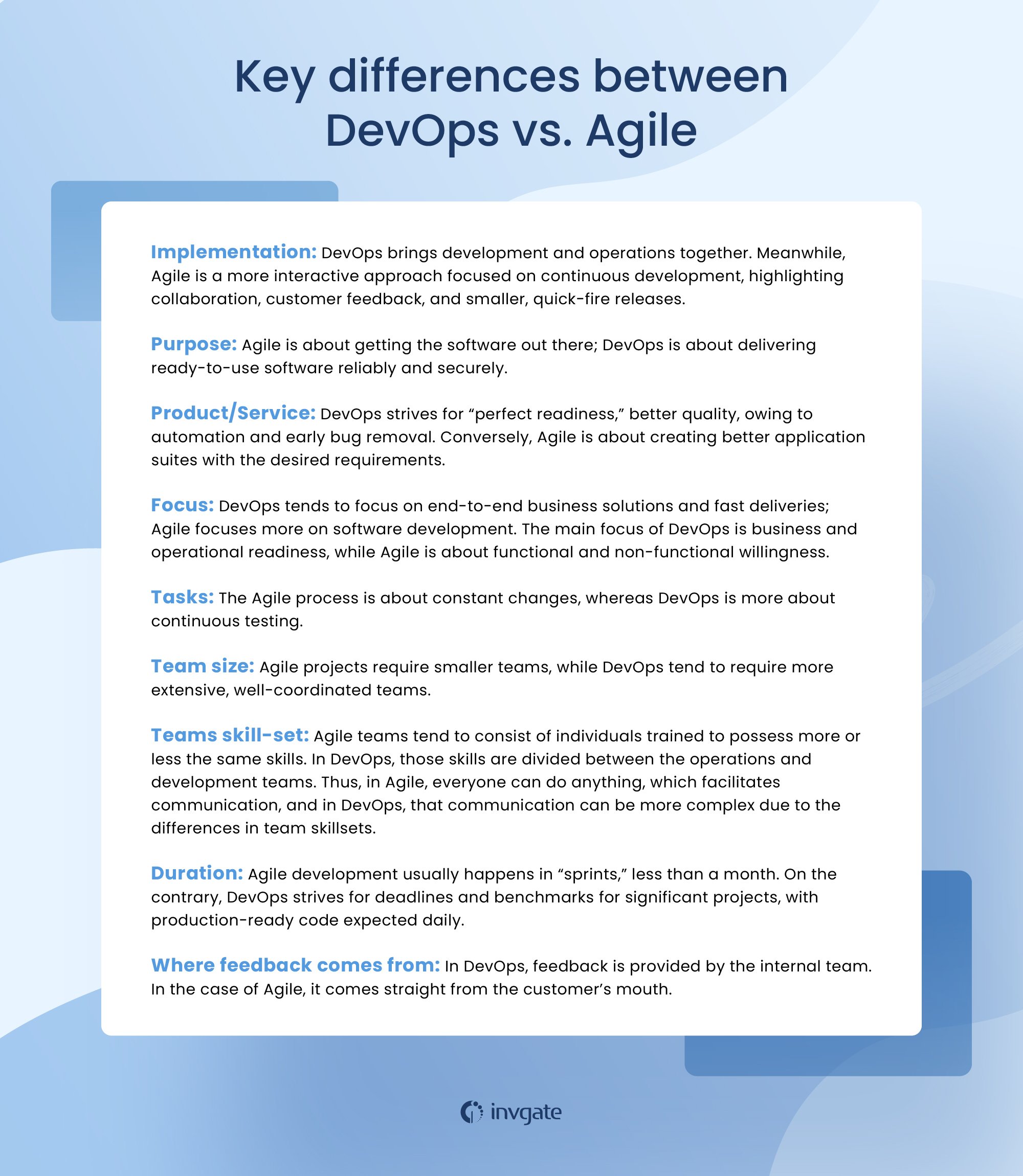DevOps has made a hugely positive impact on the way organizations operate. In essence, it’s a way for different project stages and teams to work. Truth be told, when it comes to integrating various aspects of the IT R&D chain, it’s a godsend.
On the other hand, Agile is about emphasizing continuous delivery in software development with a focus on iterative, incremental, and evolutionary development. Today, we’ll learn about DevOps vs. Agile, their fundamental differences, and how they can work together to help you succeed in your software development efforts.
But before we start, you can expand on the topic by listening to the 5th episode of Ticket Volume. In our podcast, Suresh GP explained how these practices bring value to IT businesses since they keep them relevant to change.
Now, let’s take a look at DevOps first.
What’s DevOps?
DevOps is a set of practices and tools that aims to integrate and automate processes between IT teams and software development teams. As such, it emphasizes cross-team communication, collaboration, and, of course, automation tools. The end goal of DevOps is to implicate those who work in the software development side of things with software deployment — and ensuing structural maintenance and support.
Don't forget that we’ve written a pretty handy DevOps explainer article, in case you want to further explore the methodology.
What’s Agile?
Agile is more of an iterative approach to project management and software development. The main focus is on collaboration, engagement with customer feedback, and getting projects out of the door fast while maintaining efficacy. Agile emerged in the early 2000s as a response to the need for the software industry to keep up with fast-changing market conditions and customer demands.
Regarding the Agile approach, software development tends to happen in smaller batches with much closer collaboration with stakeholders. Of course, this doesn’t mean there’s no pre-planning and design before development starts, but it’s not emphasized as much.
As continuous improvement is an integral part of Agile, changes are incorporated on an ongoing basis. As a result, you get usable versions of the product developed and released quicker than products using other methodologies. The main takeaway or benefit is that customers can experience real-time changes if the software doesn’t meet their expectations.
In short, Agile is a collection of methodologies. It combines Extreme Programming, XP, scrum, and others. These are a set of 12 principles known as the Agile Manifesto.
DevOps vs. Agile: where do they differ?
Now, it may look like DevOps and Agile do the same thing. But if we pay more attention, we’ll notice they’re not entirely similar. Here are their critical differences:
- Implementation: DevOps brings development and operations together. Meanwhile, Agile is a more interactive approach focused on continuous development, highlighting collaboration, customer feedback, and smaller, quick-fire releases.
- Purpose: Agile is about getting the software out there; DevOps is about delivering ready-to-use software reliably and securely.
- Product/Service: DevOps strives for “perfect readiness” better quality, owing to automation and early bug removal. Conversely, Agile is about creating better application suites with the desired requirements.
- Focus: DevOps focuses on end-to-end business solutions and fast deliveries; Agile focuses more on software development. The main focus of DevOps is business and operational readiness, while Agile is about functional and non-functional willingness.
- Tasks: The Agile process is about constant changes, whereas DevOps is more about continuous testing.
- Team size: Agile projects require smaller teams, while DevOps tend to require more extensive, well-coordinated teams.
- Teams skill-set: Agile teams tend to consist of individuals trained to possess more or less the same skills. In DevOps, those skills are divided between the operations and development teams. Thus, in Agile, everyone can do anything, which facilitates communication, and in DevOps, that communication can be more complex due to the differences in team skill sets.
- Duration: Agile development usually happens in “sprints,” less than a month. On the contrary, DevOps strives for deadlines and benchmarks for significant projects, with production-ready code expected daily.
- Where feedback comes from: In DevOps, feedback is provided by the internal team. In the case of Agile, it comes straight from the customer’s mouth.
As you can see, this is not so much of an either/or thing: the differences between the two frameworks can overlap and interact positively.
Let’s take a look at how we can make that happen.

Similarities between DevOps and Agile
As we can easily surmise from the previous section, DevOps and Agile are different but closely mirror each other. The Agile manifesto even contains references to DevOps principles. Hence, if you’re all about constant improvement and optimization, both DevOps and Agile can help you.
It’s easy to think of DevOps as an evolution of Agile processes or the missing link in the chain. It’s often seen as an effort to take what Agile did right innovation-wise and put that to work in operations processes. Agile processes don’t work to their maximum capacity unless you implement certain DevOps practices. In a way, Agile is at its most complete when DevOps is also being applied.
Let’s not get lost in chicken-and-egg questions here. Instead, as we said, it’s easier to look at the references to DevOps in Agile documents — practices like continuous delivery are ever-present. Still, delivery pipelines frequently include operations concerns or one of the main focuses of DevOps.
Then, there are things like amplifying feedback loops and cross-team communication. Something like a scrum in Agile can help facilitate this type of communication that’s so crucial for DevOps to succeed. Agile mainstays like daily standups, planning meetings, and retrospectives can be just what the doctor ordered to keep things on the same page.
In conclusion
Ultimately, we could say that both DevOps and Agile have the same objectives: to get software out quickly and sound. And as such, it doesn’t make sense to speak of DevOps vs. Agile, but instead of Agile and DevOps as a way to successfully tackle project management. An Agile team and a correct DevOps practice can be mutually enriching instead of mutually exclusive.
While many teams have tried to incorporate Agile unsuccessfully, others have strived. We think that utilizing one practice while failing to see what the other can bring is shortsighted, limited, and wasteful. Using one to fill in the gaps in the other can help you get to where you need to be.
And in the end, that’s what it’s all about.
Frequently Asked Questions
How do Agile and DevOps interrelate?
They both aim to get software out quickly and satisfactorily. These approaches aim to speed up development while increasing communication and efficiency.
When do Agile and DevOps work together?
When one method fills in the gaps in the other, when there’s a need to combine continuous delivery with operational concerns, that’s a central point of combination, for instance. Another is when cross-team communication and increased feedback loops are necessary. Agile can help complement DevOps with its focus on team-building and meetings.
DevOps can help complement Agile perfectly, and it’s seen as the perfect missing link in the Agile chain.
How is DevOps different from Agile?
They differ in many ways, but are also quite similar. DevOps is about increasing communication between the development and IT teams and getting software out with frequent testing and a focus on operations. Agile focuses strictly on the software development side of things.
What is a common misconception about Agile and DevOps?
That they’re the same, or that they can’t work together. There’s no “DevOps vs. Agile;” there’s a possibility for both to work perfectly well with the other.
Is DevOps replacing Agile?
While it’s seen as the evolution of Agile, both can connect perfectly well to each other. They can complement the other to the point where we could say that both reach peak effectiveness when some aspect of the other is in play to fill in the gaps.















